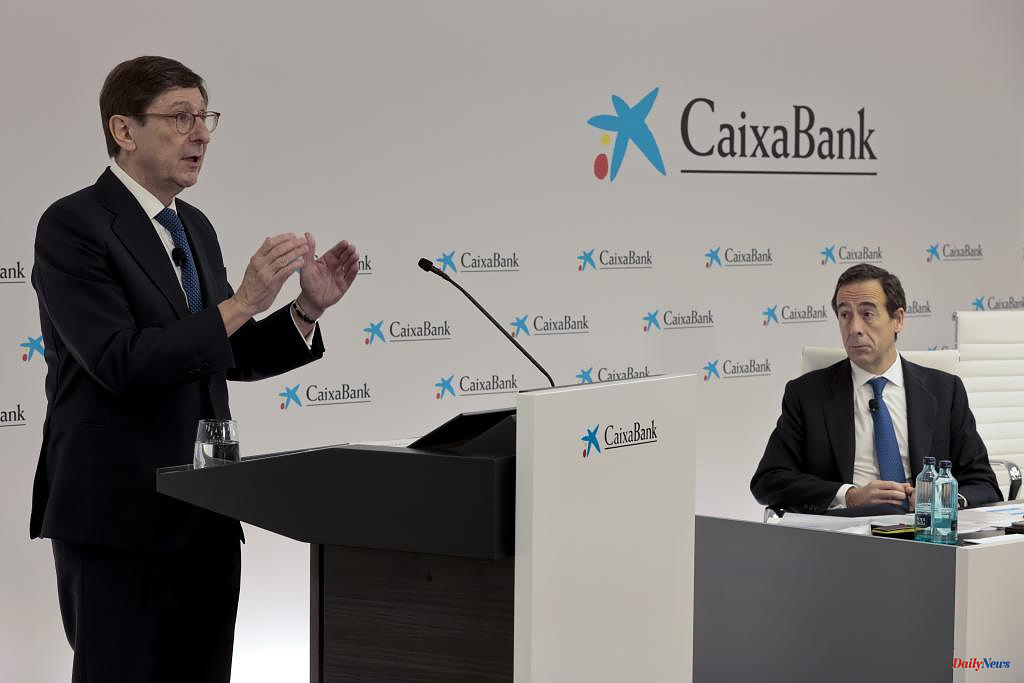CaixaBank, which has the State as a shareholder through the FROB, closed 2022 earning 3,145 million euros after its merger with Bankia, which has meant cost savings due to the reduction in the branch network and, above all, the workforce, with 6,400 voluntary departures. A "successful" process, in the words of its president, José Ignacio Goirigolzarri, which coincides with a favorable scenario for banks such as the rise in interest rates, and which explains a good part of the sector's record profits. Criticism of these figures has even come from the Government, but Goirigolzarri has been blunt: "Banking benefits are normalizing."
In the midst of the government's offensive against banks to justify its extraordinary tax and open the debate on the freezing of mortgages, Goirigolzarri has sent the opposite message. He has done it in Valencia during the presentation of the entity's results, to insist that neither the tax for profits is justified (CaixaBank is still studying whether it will appeal it, since this year it will entail the payment of 400 million euros) nor does it make sense intervene in the mortgage market, no matter how much the installments have skyrocketed with the rise in interest rates. Why? Because "the abnormal" is what has been experienced in the past, that is, a scenario of negative rates that sank the profitability of the sector.
"We are in a situation of normalization of interest rates. The strange thing has been that in Europe we have had negative rates, so we are not at historically high rates," insisted the president of CaixaBank, just one day after the Central Bank European Union (ECB) decided to raise interest rates again to leave the price of money at its highest level since 2008, at 3%.
Of course, this rise has been "very abrupt" and in record time, recognized Goirigolzarri, who has admitted that in the short term "there is an impact on the performance of the portfolio." Gonzalo Gortázar, CEO of the entity, has qualified that, in the case of CaixaBank, the improvement in results in 2022 should not be attributed directly to the rise in interest rates but rather to the integration process and the increase in activity.
The key issue for Goirigolzarri is that "profitability has been below the cost of capital" in all these years. "This situation is what is being reversed with the normalization of interest rates," she insisted. Therefore, she has warned against a hypothetical market intervention. Specifically, the mortgage, because "it is working very well." What's more, according to the bank, the demand to take advantage of the code of good practices that was agreed with the Government -and that allows the most vulnerable families to make mortgage payments more flexible and alleviate- is being limited. "We are having little demand; we have to wait," Goirigolzarri has settled.
"We are not having any increase in accounting delinquencies or an increase in defaults," he added, to highlight that "the mortgage system has worked and is working well." "We are prepared for any contingency, but we must be careful with any modification," he said when asked if he sees the freezing of variable-rate mortgages requested by Podemos as viable.
The manager, who has been very careful to respond to criticism about the supposed "impudent" benefits of the bank -in the words of the minister and leader of Podemos Ione Belarra-, has warned that in the medium and long term the bank will suffer also the rise in rates. "In the environment we are in, a rise in interest rates is intended to slow down the economy that affects our business volume, a slowdown that in turn affects delinquency levels, and we will not see it in the short term" . Nor will it be seen, she has justified, the pressure on costs that this inflationary scenario will also have for the banks.
Goirigolzarri has tried to turn around the negative discourse that once again places the bank at the center of the target: "That the bank's profitability rises is good news for shareholders and extraordinary for citizens, because only a profitable bank It will finance the economy. And in the economic crisis of 2008 he could not do it, as he has recalled. In this sense, both he and Gortázar have emphasized that 55% of the profits of 2022 will be allocated to a dividend (0.23 euros per share), with which "the FROB will receive, all Spanish taxpayers, a dividend of 300 million euros".
Goirigolzarri has also wanted to act as a protective shield for businessmen and, specifically, for the president of Mercadona, Juan Roig, also attacked from the ranks of Podemos for making money with inflation and the rise in food prices. "I wish we had many successful businessmen", he said, to remind us that the basis of a market economy is private initiative, where "companies are the ones that create wealth".
"If 15 years ago anyone asked us in which sectors the two companies that have grown the most and that are benchmarks in the Spanish economy were going to be in, nobody would have talked about the textile sector and food distribution," he added, referring to Inditex. and Mercadona. "There is no other system that has created as much wealth and well-being for citizens" as current capitalism, he has sentenced.
According to the criteria of The Trust Project












